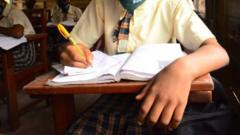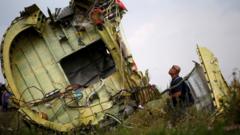Nearly 80% of students failed Nigeria's university entrance exams due to a technical glitch, leading to outrage and calls for accountability after a candidate tragically took her own life.**
Nigeria's Entrance Exam Crisis: Technical Failures and Tragic Consequences**

Nigeria's Entrance Exam Crisis: Technical Failures and Tragic Consequences**
A significant examination failure in Nigeria has resulted in widespread anger and a tragic suicide, raising urgent questions about the examination system's integrity.**
Nigeria's university entrance examination crisis has resulted in a national outcry following a shocking failure that saw nearly 80% of candidates score below the passing mark. The Joint Admissions and Matriculation Board (JAMB), the organization responsible for conducting these tests, has attributed the disappointing results to a "technical glitch" that disrupted the examination process.
Students reported facing an array of issues during the exams, including difficulties logging into the system, blank questions on their screens, and significant power outages affecting the testing environment. Tragically, the emotional toll was devastating for some, particularly in the case of 19-year-old Faith Opesusi Timileyin, who ended her life after scoring poorly on the exam for the second year in a row. Her family lamented her struggle to achieve the passing score required for university admission.
Official results revealed that only 400,000 out of the 1.9 million students who took the exam achieved the minimum score of 200 out of 400 needed for university enrollment. This has sparked outraged responses from students, parents, and educational advocates alike. Many have taken to social media to demand accountability from JAMB, with some citizens calling for the resignation of the JAMB registrar, Ishaq Oloyede, who expressed remorse during a recent press conference.
Affected candidates have been given a chance to retake their exams, with nearly 380,000 individuals eligible to participate in a new assessment process starting this Saturday. While the examination body maintains that the results reflect the true academic capabilities of the students, many observers criticize the organization's failures as harmful to Nigeria's educational framework, highlighting the need for systemic reform in the nation's examination practices.


















